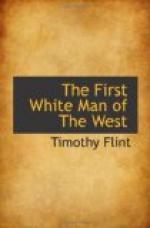But these inestimable data are wanting. Our materials are comparatively few; and we have been often obliged to balance between doubtful authorities, notwithstanding the most rigorous scrutiny of newspapers and pamphlets, whose yellow and dingy pages gave out a cloud of dust at every movement, and the equally rigid examination of clean modern books and periodicals.
CHAPTER I.
Birth of Daniel Boone—His early propensities—His pranks at school—His first hunting expedition—And his encounter with a panther. Removal of the family to North Carolina—Boone becomes a hunter—Description of fire hunting, in which he was near committing a sad mistake—Its fortunate result—and his marriage.
Different authorities assign a different birth place to Daniel Boone. One affirms that he was born in Maryland, another in North Carolina, another in Virginia, and still another during the transit of his parents across the Atlantic. But they are all equally in error. He was born in the year 1746, in Bucks county, Pennsylvania, near Bristol, on the right bank of the Delaware, about twenty miles from Philadelphia. His father removed, when he was three years old, to the vicinity of Reading, on the head waters of the Schuylkill. From thence, when his son was thirteen years old, he migrated to North Carolina, and settled in one of the valleys of South Yadkin.
The remotest of his ancestors, of whom there is any recorded notice, is Joshua Boone, an English Catholic. He crossed the Atlantic to the shores of the Chesapeake Bay, with those who planted the first germ of the colony of Maryland. A leading motive to emigration with most of these colonists, was to avoid that persecution on account of their religion, which however pleasant to inflict, they found it uncomfortable to endure. Whether this gentleman emigrated from this inducement, as has been asserted, or not, it is neither possible, nor, as we deem, important to settle; for we cannot find, that religious motives had any direct influence in shaping the character and fortunes of the hero of the woods. Those who love to note the formation of character, and believe in the hereditary transmission of peculiar qualities, naturally investigate the peculiarities of parents, to see if they can find there the origin of those of the children. Many—and we are of the number—consider transmitted endowment as the most important link in the chain of circumstances, with which character is surrounded. The most splendid endowments in innumerable instances, have never been brought to light, in defect of circumstances to call them forth. The ancestors of Boone were not placed in positions to prove, whether he did or did not receive his peculiar aptitudes a legacy from his parents, or a direct gift from nature. He presents himself to us as a new man, the author and artificer of his own fortunes, and showing from the beginning rudiments of character, of which history has recorded no trace in his ancestors. The promise of the future hunter appeared in his earliest boyhood. He waged a war of extermination, as soon as he could poise a gun, with squirrels, raccoons, and wild cats, at that time exceedingly annoying to the fields and barn-yards of the back settlers.




